
 |
Issue 4 : September 2005 |
| DELOS Home | DELOS Newsletter Front Page |
Issue 4 |
[PDF version of this issue] |
Editorial | ||
|
We welcome new and existing readers to this issue of the DELOS Newsletter and to the DELOS Network of Excellence. The aim of the Newsletter has been to keep Network members and professionals more widely interested in the development of Digital Libraries across Europe informed of the activities of DELOS and all those working in this field. With the advent of the second phase of the Joint Programme of Activity (JPA2) the capacity for collaboration across research groups and national boundaries has increased considerably. As a consequence the Newsletter is seeking to reflect the greater dynamism this represents by moving away from the more formal presentation of colleagues’ material along structural lines and instead will pick and run with material of greater immediacy and as a result, currency. As a consequence the DELOS Newsletter issues will appear more frequently with more small news items and updates from whatever quarter they are tendered. It will nonetheless point to weightier submissions on research programmes or their outcomes which will be located on the DELOS website or in the DELOS Digital Library. Therefore its active focus will move to updating colleagues and readers in briefer form on recent events and other news, to be carried in pdf format for ease of printing. If you have an item to contribute for the next issue, however small or large, do not hesitate to contact the editor at r.waller@ukoln.ac.uk As you will see from this issue, it has concentrated on the news of recent DELOS events and activity and on aspects of the DELOS Research Exchange Programme. I trust you will find a number of items that will prove of interest to you in this new format. Costantino Thanos
|
||
AVIVDiLib'05 the Product of Two Collaborating Clusters | ||
| The AVIVDiLib'05 workshop (Seventh International Workshop of the EU Network of Excellence DELOS on Audio-Visual Content and Information Visualization in Digital Libraries), was held in Cortona, Italy, 4-6 May 2005. 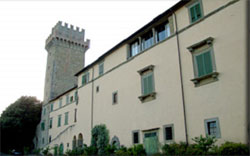 Palazzone di Cortona, venue for AVIVDiLib '05 The workshop, promoted by the DELOS Network of Excellence aimed at providing a forum to present the latest research results, new technology development and new applications in the areas of multimedia content and information visualization in digital libraries. AVIVDiLib'05 was jointly organized by Audio-Visual and Non-Traditional Objects (A/V-NTO) and User Interfaces and Visualization (UIV). AVIVDiLib'05 received a total of 49 submissions of which 16 papers and 17 posters were accepted. The accepted submissions represented a significant sample of recent achievements in several areas, ranging from sophisticated visualizations of the information to sound and video management in multimedia environments. Over 50 people participated in the workshop. AVIVDiLib'05 was privileged to have two distinguished keynote speakers:
Peter Pirolli, from XeroX PARC, USA and Hong-Jiang Zhang, MSR Asia Advanced
Technology Center, China. Peter Pirolli described novel methods for making
sense out of information while Hong-Jiang Zhang addressed today’s
challenges in video content management.
|
||
The 4th DELOS Summer School: | ||
|
The 4th DELOS International Summer School on digital library technologies was held in Sophia-Antipolis Science Park, France, over 5-11 June 2005. The school was concerned with the issues surrounding the long-term preservation of information in digital form, based on a programme put together by Seamus Ross of the University of Glasgow and Digital Curation Centre, UK, and Hans Hofman of the Nationaal Archief, Netherlands. Students, both computer scientists and practitioners with experience of dealing with digital objects, came from all parts of the world. The event was organised by PRESERV of the DELOS Network of Excellence on Digital Libraries and co-sponsored by the Digital Curation Centre and ERPANET. 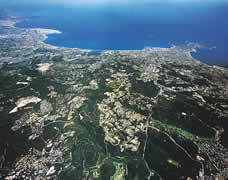 Aerial view of Sophia Antipolis Science Park, Côte d'Azur, France. Photo courtesy of JJ.L'Héritier/C.A.D. The school got under way on the evening of Sunday 5 June with an overview and introduction by Seamus Ross. The next day the school began the first of ten 3-hour themed sessions over that week, each led by one or more tutors. David Giaretta of the Rutherford Appleton Laboratory and Digital Curation Centre (UK) led the opening session, an introduction to the increasingly influential Reference Model for an Open Archival Information System (OAIS). While most of the entities defined by OAIS - i.e., ingest, archival storage, administration, access, data management - could be seen to be applicable to other types of service, David noted that the preservation planning function was unique, representing the active tasks of monitoring the technical environment and designated community to ensure that information stored in an OAIS remains accessible. Next came Michael Day of UKOLN, University of Bath, UK, who provided an introduction to the role of metadata in preservation. His initial presentation argued that collecting and maintaining metadata was essential to the long-term preservation of digital information and elaborated some of the different preservation functions that it could support, in part based on the information types identified by the OAIS information model. Michael also looked at metadata initiatives with relevance to digital preservation including the recently published PREMIS Data Dictionary for Preservation Metadata. Anne R. Kenney of Cornell University, USA, focused on the development of institutional responses to digital preservation and the pre-eminence of organisational will and resources over technological considerations if success is to be achieved. Anne explained how Cornell had merged the OAIS functional entities with the attributes of trusted digital repositories identified by the Working Group on Digital Archive Attributes and then mapped Cornell's processes to the merged model. She also outlined five organisational stages of digital preservation which led to the conclusion that preservation is dependent on inter-institutional collaboration and co-operation. Stephan Heuscher of iKeep Digital Archives Services, Switzerland, addressed workflows and workflow modelling and maintained they were useful for supporting automation, traceability and the sharing of implicit knowledge. Birte Christensen-Dalsgaard of the State and University Library in Århus, Denmark, spoke on the management of ingest. This focused in the main on Web resources. Birte then introduced different methods of ingest with reference to various Danish initiatives, including the use of harvesting techniques by Web archives and institutional repositories. Andreas Rauber of Vienna University of Technology, Austria, and Hans Hofman jointly led the session based on work undertaken by the DELOS Digital Preservation cluster on the development of testbeds for the consistent measurement and evaluation of digital preservation strategies. They noted that such testbeds could inform the selection of preservation strategies and help to document the decision-making process. They emphasised the finding that testbeds provide a consistent experimental environment that encourages those selecting strategies to examine preservation objectives and to decide which evaluation criteria are most important. David Giaretta returned to address the key OAIS concept of representation information. The OAIS model defines this as the "information that maps a Data Object into more meaningful concepts." David argued that the existence of persistent and trusted registries of representation information would support the sharing of effort. 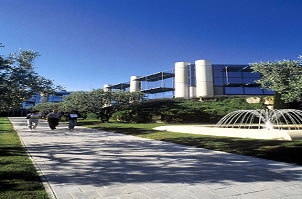 Amadeus Building, Sophia Antipolis Science Park, photo courtesy G.Martinez/C.A.D. Ross Harvey of Charles Sturt University, Australia, emphasised the importance of making documented decisions about selection when preserving digital materials. His session surveyed current thinking on selection and appraisal and noted that digital materials were different from traditional ones because preservation decisions needed to be made early in their lifecycle as well as the problems of quantity and high maintenance costs. Manfred Thaller of the University of Cologne (Universität zu Köln), Germany, led the final session on digital libraries as persistent collections of autonomous objects. This session underlined the importance of autonomy, i.e. that digital objects must be able to survive even if the system of which it was a part is destroyed. The 2005 DELOS Summer School was a useful opportunity to spend a week discussing digital preservation issues with a highly informed and motivated set of students. Initial feedback also suggested that the school had been useful for students, raising the possibility that the event could be repeated. Further information on the summer school, including session plans and tutor biographies, is available on the DELOS Digital Preservation cluster website. Further information:
|
||
TUC, the Ionian University and UKOLN Co-operate in JPA2 |
||
|
The Technical University of Crete (lead) is currently working with UKOLN (University of Bath) and the Ionian University on a joint proposal which constitutes part of the DELOS Joint Programme of Activities Phase 2 (JPA2). The task upon which the partners are co-operating concentrates on the interoperability of audio-visual digital libraries and e-learning applications, in order to support the modular development of personalised learning experiences. 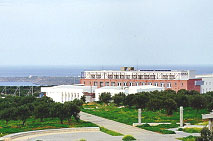 Part of Technical University of Crete (photo by Technical University of Crete) In particular, the work will focus on semantic mappings between learning standards and audiovisual content standards in order to develop a robust model that will allow for the use of semantic descriptions of audiovisual content objects and/or segments that reside on a digital library in order to support the creation of reusable learning objects that may be used in the assembly of personalized courses. In addition, the model will allow users who participate in e-learning activities to browse and retrieve audio-visual objects from digital libraries, which match their interests, and to use them as learning resources. During a Knowledge Extraction and Semantic Interoperability (KESI) meeting held in Heraklion on 13 June 2005, TUC presented a proposed architecture and related technologies to provide a framework for the research and development work to be done in the Task. The technical work is mainly based on the integration of of MPEG7 and SCORM as the major interoperability standards in the audiovisual and e-learning sectors respectively, and the use of ontologies in order to provide a means to fill their mutual gaps. These ontologies will also be used to provide the knowledge needed to support the creation of personalized learning experiences in combination with an appropriate Learner Model. 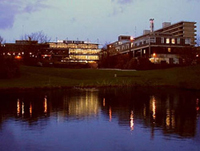 University of Bath The work is progressing with the submission by UKOLN of an internal report (July 2005) investigating personalization in the context of this particular task and the work plan proposed by TUC. A further meeting is scheduled on 23 September following a KESI meeting with the aim of progressing the work already outlined and in particular the development of a Learner Model appropriate to this area of work. Further information:
|
||
DELOS Researcher Exchange
Programme | ||
|
The DELOS Researcher Exchange Programme for organizations working on joint projects is certainly proving one of the most effective ways to achieve greater integration of the working teams and the practical exchange of both skills and results. To support the implementation of such exchange programmes, DELOS is providing some funding to cover the additional expenses that might be required for these exchanges. Setting up this sort of exchange, such that a researcher from one project partner institution can work and consult as the guest of another partner institution, is a relatively lightweight business procedurally. Host and guest institutions put together a simple proposal to their cluster leader who evaluates its relevance to the cluster and, if content, forwards it to the Scientific Co-ordinator. He approves or rejects such proposals within a fortnight and successful proposals are enacted within a month of his approval. One need only look at last year’s proposals which turned into exchanges to see that the programme has seen considerable activity: Researcher Exchanges in 2004:
One of the researchers involved in last year’s programme was Harald Krottmaier who works at IICM, University of Technology, Graz, Austria. When we asked Harald for his views on his exchange he said, "I've really learned a lot ... and will surely remember this exchange for a long time!" Harald, who was able to organize his time with Professor Hans Schek at ETHZ, Switzerland, around existing lecturing commitments, looked into issues regarding services (Digital Library Architecture Cluster) and metadata (since IICM colleagues were working on creating a survey of metadata in the context of digital libraries), with particular reference to describing services and making services available to users. Harald said,“Professor Schek and his team naturally had a great deal to do themselves but they nonetheless provided me with the infrastructure and support for me to carry out useful and instructive work. I greatly valued the opportunity to discuss matters such as OSIRIS with colleagues at ETHZ and I even managed to squeeze in a little sight-seeing!" Another successful exchange was reported by Markus Franke, winner of the Young Researcher Award awarded by DELOS at ECDL 2004 at the University of Bath. Markus spent nearly a month at the Ionian University in Athens with Sarantos Kapidakis and his colleagues testing the applicability of a restricted random walk based clustering method on library search terms. 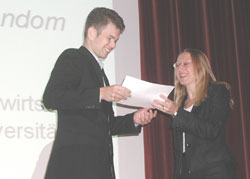 Markus Franke receiving the Young Researcher Award from Liz Lyon, Director of UKOLN, at ECDL 2004 The Newsletter asked Markus for his reactions to his stay. Markus said, “The work has been very productive, and the ideas that we developed represent not only a promising basis for further cooperation but will be something I most definitely wish to continue with back home in Germany. The four weeks at the Ionian University proved a very interesting and invaluable experience. We found a new application for the RRW algorithm that is relevant for electronic reference systems and we established contacts for further common research. I would like to thank the DELOS Network of Excellence for funding this stay and providing me with such a welcome opportunity. Equally, my gratitude goes to Professor Sarantos Kapidakis for hosting my stay as well as for the many stimulating discussions we had during the exchange. And from a personal standpoint, I really appreciated the hospitality and kindness extended to me by all my colleagues in both Corfu and Athens who made my stay such an unforgettable experience." To get a perspective from a hosting organization, the DELOS Newsletter contacted Professor Sarantos Kapidakis for his views on the Exchange between the University of Karlsruhe and the Ionian University. Sarantos sent us his reaction: "Markus Franke's exchange was a very useful experience for the Laboratory on Digital Libraries and Electronic Publishing of the Ionian University. When I first invited Markus to the Archive and Library Sciences Department, I was slightly hesitant and not entirely sure what the outcome of the exchange would be: like everywhere else, everyone had his or her normal workload, and we had no spare infrastructural support we could offer. But in such circumstances there is always room for one more person if we try. Markus' activity here and the interesting discussions we had helped us to see some problems, and approaches to their solution, from a different perspective, and to recognize their similarity to other cases. Markus also identified new problems, from different areas, on which it would be appropriate to try his solutions. The exchange allowed us to bring together differing perspectives across our areas of work which proved to be beneficial to all concerned, and I hope we have more such visits in the future.” Although the Researcher Exchange Programme is mainly intended to facilitate integration among DELOS members, the DELOS contribution can also be granted in cases where the sending organization is not a DELOS member (the receiving organization has to be a member). Of course, in such instances, the purpose of the visit must be just as relevant to the DELOS Programme of Activities as between two member organizations. Organizations which are not members of DELOS but which are interested in participating in DELOS activities, either through the Researcher Exchange Programme, or through joint research, are cordially invited to send any proposal to the Chair of the DELOS Scientific Board, Dr. Costantino Thanos thanos@isti.cnr.it Further information:
|
||
Grid Technologies for Digital Libraries | ||
| Mike Mineter, National e-Science Centre, Edinburgh | ||
|
There is growing recognition that digital libraries and grid computing are poised to open new horizons for learning and for research. During a joint DELOS/DILIGENT/EGEE event in Athens last April, attended by 29 people from 9 countries, Yannis Ioannidis recognized that digital libraries need "systems that are people-centric, collaborative, distributive, generic, and appropriate for a wide variety of applications". These are the goals that drive the development of Grid computing, and so the DILIGENT Project is building upon the middleware and infrastructure provided by the Enabling Grids for E-sciencE (EGEE) Project. In Athens, Heiko Schuldt explored the relevance of Peer-to-Peer and service-oriented approaches, as well as grids, and emphasized that these are by no means orthogonal. The EGEE training team then introduced grid computing and the EGEE Project. Building on the achievements of many initiatives in grid computing over several years, EGEE is providing a production-quality infrastructure of operational support and middleware services - the production quality being in contrast to the best-efforts prototypes of grids to date. Grid infrastructure supports multiple research communities by dynamically, flexibly, and securely creating for each community a "virtual computing environment." Requirements for collaboration, for managing intense computational demands with high volumes of data, and federation of multiple large data resources are met by middleware services. Services specific to an application community are built upon generic middleware that gives authentication, authorization and single-sign-on to geographically widespread resources of data and computers. These resources are provided by many institutions, in general operating under distinct administrative domains. A grid does not impose any centralized control - resources remain controlled by their owning institutes - users rights being assigned by policies agreed between site managers, grid operators and the research communities. EGEE inherited and re-engineered middleware that emerged from earlier European and US projects, in particular from high-energy physicists engaged in building new experiments at CERN. EGEE is now supporting a wide range of science projects - including bioinformatics, chemistry, astrophysics, earth science and earth observation. Yet although sciences have been the early adopters of the technology - often sciences with new generations of instruments - grid computing is expanding its horizons further. It is beginning to serve those engaged in social sciences, arts and humanities, and so the term "e-Science" is making way for "e-Research". Grid computing is further broadening its horizons by enabling the federation of 'legacy' databases, going beyond its initial emphasis on managing data created by new research. As readers of this newsletter well know , research is one element in a cycle of activity from the generation of new knowledge, through its curation, to its re-use in future research and education. In each of these elements resources are held in many institutions, computational demands can be intense, and data volumes large: there is a need for grid computing to support a new generation of "virtual digital libraries", as DILIGENT will demonstrate. The partnerships with the digital library community will help the horizons of grid computing to expand, to include the dynamic provision and configuration of many services broadly needed across research and education. Further information:
|
||
| DELOS Home | DELOS Newsletter Front Page |